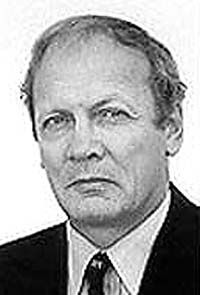Ukraine’s nonaligned status and dependence on the eastern vector of its foreign policy have brought about the assumption that we will not join NATO but at the same time do not refuse to cooperate with it. The trouble is that, instead of taking full advantage of this cooperation, we usually do the job the way we can. Our cooperation still touches upon issues that play a demonstrative, rather than practical, role. However, The Day interviewed Edgar BUCKLEY, NATO Assistant Secretary General for Defense Planning and Operations, who expresses a different opinion. He is quite optimistic about future contacts between Kyiv and Brussels, customarily points out Ukraine’s importance in the security architecture on the European continent, and does not believe Russia will oppose NATO’s eastward expansion. Incidentally, a Russian diplomat told The Day during Lord Robertson’s visit that there is no question of confrontation: Russia is only exercising a certain caution. Moreover, had it not been for NATO operations in Yugoslavia in 1999, Moscow would now be showing no suspicion at all, the diplomat claims. But Ukraine, in his opinion, should pursue a policy of balance under any circumstances, which it is in fact doing today. The West is also hinting at the same thing.
“Many Ukrainian observers claim that NATO pays too little attention to Ukraine. Is this true and what should Kyiv do to have its opinion heeded?”
“This is untrue. Ukraine receives a lot of attention from NATO. For example, this is my third visit to Kyiv during the past six months. We have a very strong basis for bilaterial relations. We maintain a good political mutual understanding at the top level. We want to further follow this path. In my opinion, Ukraine has made its strategic choice by cooperating with NATO in carrying out defense reforms. Ukraine and NATO are closely collaborating within the framework of a commission that provides for political consultations and practical cooperation. Over the past eighteen months we have considerably strengthened our practical contacts in the field of Ukrainian armed forces reform. We have already made our preliminary conclusions as far as the defense reforms are concerned. Now we are working at the next stage: the attainment of longer-term goals. Of course, there are always some problems, for example, a huge number of them in the defense reform. The armed forces of your country should be modernized and slimmed down. The current plans in this area should meet the original targets. In fact, Ukraine has not been left alone with its problems. We have plenty of experience to share with Kyiv. Both sides wish to cooperate in this field, but nobody is forcing anybody.”
“Would NATO like to see in its ranks a member like Ukraine in the distant future?”
“This is not a question for me to answer. This is politics, so it is Ukraine itself that must answer it. Any country can join NATO, but only after it has expressed its desire to do so. This right has now been exercised by nine countries seeking NATO membership. We confirm our open-door policy. And we have come to Kyiv not at all to force Ukraine to become a NATO member. If in time Ukraine takes a different view, then everything is possible.”
“How should Ukraine behave if relations between NATO and Russia become more tense because of the alliance’s eastward expansion?”
“I expect Russia to remain cooly and calmy, as it usually does. Moscow should recognize the right of every state to choose the framework of its security, and I think Russia is sure to do so. We are gradually gaining the impression that Russia understands NATO’s position. Cooperation with Ukraine does not depend in this context on the process of expansion. We regard Ukraine as a state important to European stability. We want to assist and maintain strong relations with Ukraine. I personally do not expect the expansion to result in deterioration with Russia.”
“Do the Ukrainian sales of airplanes and helicopters to Macedonia run counter to NATO’s opinion that the conflict should be settled by political, not military, means?”
“We really want a political settlement. But simultaneously we respect the right of the Macedonian government to bolster its own security. I think Ukraine also favors a political solution of the conflict. Yet, one must exercise extreme caution when supplying weapons. Ukraine is doing exactly this. We do not deny Macedonia the right to take care of its own security in the face of the current threat.”







